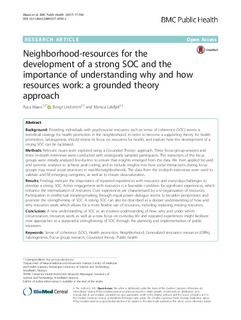| dc.contributor.author | Maass, Ruca Elisa Katrin | |
| dc.contributor.author | Lindstrøm, Bengt | |
| dc.contributor.author | Lillefjell, Monica | |
| dc.date.accessioned | 2017-10-10T06:52:06Z | |
| dc.date.available | 2017-10-10T06:52:06Z | |
| dc.date.created | 2017-10-09T13:43:37Z | |
| dc.date.issued | 2017 | |
| dc.identifier.citation | BMC Public Health. 2017, 17 704-?. | nb_NO |
| dc.identifier.issn | 1471-2458 | |
| dc.identifier.uri | http://hdl.handle.net/11250/2459299 | |
| dc.description.abstract | Background
Providing individuals with psychosocial resources such as sense of coherence (SOC) seems a beneficial strategy for health promotion in the neighborhood. In order to become a supporting theory for health promotion, Salutogenesis should renew its focus on resources for health, and explore how the development of a strong SOC can be facilitated.
Methods
Relevant issues were explored using a Grounded Theory- approach. Three focus-group-sessions and three in-depth interviews were conducted with strategically sampled participants. The transcripts of the focus groups were initially analyzed line-by-line to ensure that insights emerged from the data. We then applied focused and systemic analyses to achieve axial coding, and to include insights into how social interactions during focus groups may reveal social processes in real-life-neighborhoods. The data from the in-depth interviews were used to validate and fill emerging categories, as well as to ensure data-saturation.
Results
Findings indicate the importance of repeated experiences with resources and every-day-challenges to develop a strong SOC. Active engagement with resources is a favorable condition for significant experiences, which enhance the internalization of resources. Core experiences are characterized by a re-organization of resources. Participation in intellectual meaning-making through equal power dialogue seems to broaden perspectives and promote the strengthening of SOC. A strong SOC can also be described as a deeper understanding of how and why resources work, which allows for a more flexible use of resources, including replacing missing resources.
Conclusion
A new understanding of SOC as an intuitive understanding of how, why and under which circumstances resources work, as well as a new focus on everyday life and repeated experiences might facilitate new approaches to a purposeful strengthening of SOC through the planning and implementation of public measures. | nb_NO |
| dc.language.iso | eng | nb_NO |
| dc.rights | Navngivelse 4.0 Internasjonal | * |
| dc.rights.uri | http://creativecommons.org/licenses/by/4.0/deed.no | * |
| dc.title | Neighborhood-resources for the development of a strong SOC and the importance of understanding why and how resources work: a grounded theory approach | nb_NO |
| dc.type | Journal article | nb_NO |
| dc.type | Peer reviewed | nb_NO |
| dc.description.version | publishedVersion | nb_NO |
| dc.source.volume | 17 | nb_NO |
| dc.source.journal | BMC Public Health | nb_NO |
| dc.identifier.doi | 10.1186/s12889-017-4705-x | |
| dc.identifier.cristin | 1503390 | |
| dc.description.localcode | © The Author(s). 2017 Open Access This article is distributed under the terms of the Creative Commons Attribution 4.0 International License (http://creativecommons.org/licenses/by/4.0/) | nb_NO |
| cristin.unitcode | 194,65,30,0 | |
| cristin.unitcode | 194,65,20,0 | |
| cristin.unitcode | 194,13,0,0 | |
| cristin.unitname | Institutt for nevromedisin og bevegelsesvitenskap | |
| cristin.unitname | Institutt for samfunnsmedisin og sykepleie | |
| cristin.unitname | Prorektor for forskning | |
| cristin.ispublished | true | |
| cristin.fulltext | original | |
| cristin.qualitycode | 1 | |

